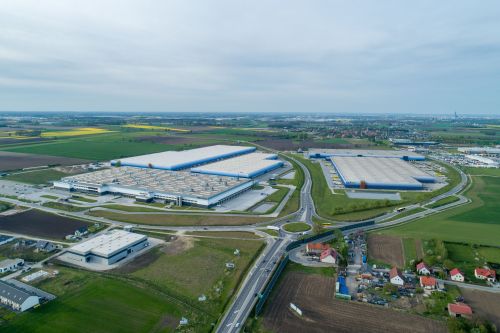Difficult choices all year round
Eurobuild Awards
New projects mean new jobs and more money flowing into municipal coffers, which is particularly desirable in an election year. Investors mainly associate the run-up to local elections as a period when administrative procedures get drawn out and town clerks are impotent, whereas council leaders and mayors are more willing than usual to have themselves photographed at the openings of buildings or when putting their signatures to schemes intended to transform the city into a land of milk and honey (if only at some undetermined point in the future). So how has the marriage of private capital and local government been working out this time around?
The ideal relationship
Virtually all construction projects are conceived and executed with the close involvement of local authorities – and the bigger the project, the more valuable and more necessary the local government’s support is. Without good relations it would not only be difficult to carry out commercial projects, it would sometimes simply be impossible. “Municipal assistance can be provided at various levels – starting with making sure the project is prepared properly and the access routes are agreed upon, to giving the go-ahead to other related projects that in many cases have to be carried out together with the main work or with the work on the infrastructure,” explains Robert Dobrzycki, the Europe CEO of Panattoni Europe.
“The contact with a local authority is one of the most important relationships for a project management company,” insists Jacek Korwin-Małaszyński, a member of the board of APP Projekt. “When it comes to such contacts, it is serenity, stability and commitment that we value the most. The local authority also needs to be open to new initiatives, to take an active part as co-creators and also be open to innovative ideas,” he adds.
City councils (especially the larger ones) often appoint separate specialised bodies (departments, companies and agencies) to seek out and deal with investor and developer relations. However the form and size of such an organisation is absolutely irrelevant – the leader of the council or mayor is sometimes able to provide a company with better terms and conditions than an army of dedicated specialists. The competences of those involved and their attitude are also of importance. If an investor is forced to declare at the beginning what it can offer in return, then this does not bode well for how the two sides will work together in the future.
“The value of an administration’s transparency cannot be overstated: if they make it clear from the outset how the permits are to be issued, then we can work together much more effectively,” states Zbigniew Juroszek, the CEO of Atal. “However, if the bureaucracy becomes bloated and departments just pass the buck, then unfortunately the whole process gets dragged out, which means higher project costs and, as a result, higher house prices,” he explains.
Another feature that is important for local governments is that they should clearly communicate their expectations for a project from the very outset. “We appreciate a certain level of consistency that allows us to avoid situations where we have to start again from scratch when we are already at an advanced stage in the planning,” says Piotr Kroenke, the CEO of GTC. “At the start we can make changes quite freely, but our flexibility becomes very limited in the later stages. Although it is not always obvious, a huge amount of work is needed for everything we have to compromise on with the local authorities. Therefore, as an investor, we want their demands to be laid down at the beginning without any major changes later during the course of the work,” he adds.
And the pressure?
How does the attitude of a local authority affect how a project is developed? Can a city council, intentionally or not, make it difficult for – or even perhaps block – individual projects? “Local authorities have a huge impact on how projects are prepared. Without their consent we cannot move on to start construction,” claims Piotr Kroenke. “It’s worth making the point that the law specifies when a building permit should be issued but it does not say anything about when the other necessary documents should be granted. The importance of local authority support cannot be overstated. From the very beginning it’s up to them to determine what kind of relationship we are going to have with the officials involved in a given project,” says the CEO of GTC. “Any obstinance from the local authorities will result in projects being delayed or in so many problems building up that an investor is just going to give up,” admits Robert Dobrzycki of Panattoni Europe. “Fortunately, this happens very rarely. Our company has mostly had positive experiences of local authorities being very supportive,” adds the CEO of Panattoni.
“There are cities that have been lacking investment for years, so the local authorities tend to be very amenable, because they want to compete with other cities in attracting business,” explains Zbigniew Juroszek of Atal.

“We appreciate a certain consistency in the arrangements that allows us to avoid situations where we have to start again from scratch when we are already at an advanced stage in the planning,” says Piotr Kroenke, the CEO of GTC
Such is life
The stories developers tell off the record about their actual experiences of working with local government would fill several volumes if they were published – and they combine elements of Greek tragedy with American horror. For obvious reasons, the official accounts tend only to have happy endings or involve unnamed parties. “Many years ago we applied for some certificates we needed but the planning department refused to issue them. The Local Government Appeal Council took our side in the dispute. Today we are faced with a similar situation – the same authority has refused to issue certificates for a similar project,” says Władysław Grochowski, the president of Arche, with some regret. “As an investor we once found ourselves in a situation where, after many years of preparation work on a project, the authorities suddenly completely changed their minds about the form it should take,” complains Piotr Kroenke of GTC. “Furthermore, their new assessment, which was not good for us, didn’t seem to stem from any legal requirements. Despite the huge number of points we had already agreed on, we were unable to create our concept in that location at that time,” he admits.
One of the developers we spoke to told us about the local authority that had set up a unit for liaising with investors – but only from abroad. And because of this, Polish developers had no chance of operating in the city – the unit simply wouldn’t deal with them. On the other hand, developers also have many stories about working successfully together with local authorities. “When we approached the mayor of Katowice with our plan to develop an office building in the city, we were introduced to the heads of all the relevant departments at the first meeting,” recalls the CEO of GTC. “This was a clear sign that the council officials were at our disposal and that we could count on their help to obtain a building permit at the earliest occasion. Our work together went perfectly smoothly.”
All the market players we spoke to would like to count on such a cooperative attitude and an awareness that both parties are working towards the same goal for all their projects and dealings with mayors and local authorities – and throughout their entire term in office, rather than only at the run-up to elections. And then there is the added problem that after an election the authorities of many municipalities will change and new decision-makers installed. They will then have to familiarise themselves with all the ongoing projects in the city, possibly having little or no prior knowledge of them. And this can take a long time. One thing is for certain: the Eurobuild Award for the Most Investor-Friendly City will go, as it does every year, to one of those special local authorities that – along with having a thorough understanding of the specifics of the real estate sector – also helps investors in developing their projects regardless of any economic or political turmoil. ν





















































